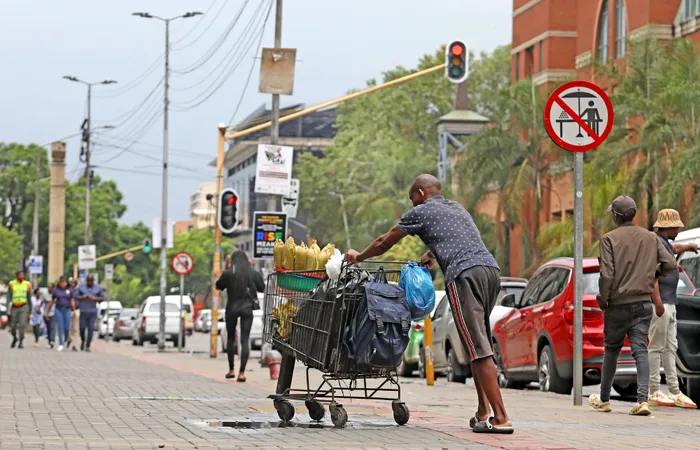Stats SA and Capitec Bank CEO discuss South Africa's unemployment crisis

A street vendor pushes his trolley in the Pretoria CBD. Stats SA has defended its unemployment statistics after questions were raised about whether the informal economy was taken into consideration.
Image: Oupa Mokoena / Independent Newspapers
Stats SA has defended the integrity of its official unemployment statistics following a high-level meeting with Capitec Bank CEO Gerrie Fourie, who recently questioned the credibility of the country's 32.9% unemployment rate.
The meeting, held in Stellenbosch last week, brought together Minister in the Presidency Khumbudzo Ntshavheni, Statistician-General Risenga Maluleke, senior Stats SA officials, and National Treasury representatives to address comments made by Fourie, who suggested South Africa’s real unemployment rate might be closer to 10%, based on Capitec’s observations of informal economic activity.
In response, Stats SA gave what it described as a “comprehensive presentation” of the methodology used in its Quarterly Labour Force Survey (QLFS), which it said adheres to International Labour Organization (ILO) standards and includes informal and self-employed workers.
“Stats SA methods remain robust,” Maluleke said. “We do not fix statistics to feel better about our reality. We reflect that reality so the country can make evidence‑based decisions to change it.”
Fourie, who welcomed the engagement, said: “We are committed to working with the government and the private sector to help South Africa grow. The informal market is vibrant and dynamic, but we believe this growth will only be achieved once the informal economy is properly understood and supported with the right policy frameworks, infrastructure, funding, and skills development.”
Maluleke acknowledged that Stats SA was open to further improving the quality of labour market data, including exploring the development of a statistical register for small and informal businesses. “We have listened to them, and we need to investigate the issues of a statistical register for small business,” he said.
The meeting followed Minister Ntshavheni’s comments during Stats SA’s Budget Vote debate in Parliament. She said more consultations were expected with other stakeholders, including in the short-term insurance sector.
In a joint commitment, Stats SA and National Treasury affirmed their support for stronger data systems and continued engagement with both public and private stakeholders. “Future updates will be communicated as developments occur,” the statement read.
Stats SA stated it would conduct "methodological tests and innovations" in the coming years to refine labour indicators and ensure better capture of the informal economy within the National Statistics System.
Related Topics: